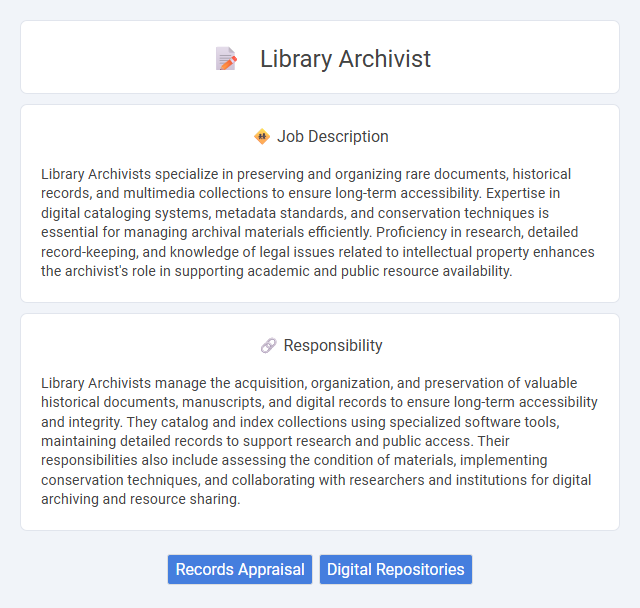
Library Archivists specialize in preserving and organizing rare documents, historical records, and multimedia collections to ensure long-term accessibility. Expertise in digital cataloging systems, metadata standards, and conservation techniques is essential for managing archival materials efficiently. Proficiency in research, detailed record-keeping, and knowledge of legal issues related to intellectual property enhances the archivist's role in supporting academic and public resource availability.
Individuals with strong organizational skills and attention to detail are likely to be well-suited for a Library Archivist role, as the job demands meticulous management of historical documents and records. Those who prefer solitary work environments and have a passion for preserving cultural heritage may find this occupation fulfilling. Conversely, individuals who struggle with extended periods of focused, repetitive tasks or have difficulty maintaining accuracy might face challenges excelling in this position.
Qualification
Library Archivists typically require a master's degree in library science, archival studies, or a related field accredited by the American Library Association (ALA). Proficiency in digital cataloging systems, metadata standards like Dublin Core, and preservation techniques is essential for managing archival collections effectively. Experience with historical research, information organization, and specialized software such as Archival Management Systems enhances a candidate's qualification for the role.
Responsibility
Library Archivists manage the acquisition, organization, and preservation of valuable historical documents, manuscripts, and digital records to ensure long-term accessibility and integrity. They catalog and index collections using specialized software tools, maintaining detailed records to support research and public access. Their responsibilities also include assessing the condition of materials, implementing conservation techniques, and collaborating with researchers and institutions for digital archiving and resource sharing.
Benefit
A Library Archivist could likely enjoy access to a wide range of unique historical resources, fostering continual learning and professional growth. There is a strong chance of experiencing job satisfaction from preserving valuable cultural and historical records for future generations. The role might also offer opportunities for collaboration with academics and researchers, enhancing one's professional network.
Challenge
Library archivist roles likely present significant challenges in managing and preserving diverse collections amid evolving digital technologies. The probability of encountering complex metadata standards and ensuring long-term accessibility may demand continuous learning and adaptation. Balancing resource constraints with the need for accurate cataloging and public access appears to be a frequent difficulty in this field.
Career Advancement
Library Archivists manage collections of valuable documents and historical records, developing expertise in preservation and digital cataloging to enhance access and research capabilities. Advancing in this career often involves gaining specialized certifications, such as the Certified Archivist credential, and taking on leadership roles within archives or library systems. Opportunities for career growth include becoming Archivist Supervisors, Collections Managers, or Directors of Archives, utilizing skills in project management and digital technologies to lead innovative preservation initiatives.
Key Terms
Records Appraisal
Library archivists specialize in records appraisal by systematically evaluating documents to determine their historical, legal, and administrative significance. This process ensures the preservation of valuable information while efficiently managing storage resources. Accurate records appraisal supports effective archival organization, facilitating accessibility and long-term preservation of essential data.
Digital Repositories
Library Archivists specializing in digital repositories manage, preserve, and provide access to digital collections, ensuring long-term usability and authenticity. They utilize metadata standards such as Dublin Core and PREMIS to organize digital assets and implement digital preservation strategies including migration and emulation. Expertise in content management systems like DSpace, CONTENTdm, and Fedora Commons is essential for maintaining scalable and secure digital archives.
 kuljobs.com
kuljobs.com